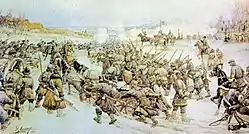Siege of Moscow (1606)
The Siege of Moscow (1606) was a siege of Moscow by the detachments of Ivan Bolotnikov in the fall of 1606, during the Time of Troubles.
| Siege of Moscow | |||||||
|---|---|---|---|---|---|---|---|
| Part of Uprising of Bolotnikov | |||||||
 The beginning of the battle of Bolotnikov's army with the tsar's troops at the Nizhniye Kotly near Moscow. Ernest Lissner | |||||||
| |||||||
| Belligerents | |||||||
| Ivan Bolotnikov |
| ||||||
| Commanders and leaders | |||||||
|
Ivan Bolotnikov Grigory Sumbulov Prokopiy Lyapunov Istoma Pashkov Ileiko Muromets |
Mikhail Skopin-Shuisky Vasily Golitsyn Boris Tatev | ||||||
| Strength | |||||||
| Up to 100,000 people | Unknown | ||||||
| Casualties and losses | |||||||
| Unknown | Unknown | ||||||
After the capture of Kolomna, Bolotnikov moved to Moscow. In the village of Troitskoye, Kolomenskoye Uyezd, he managed to defeat troops loyal to Tsar Vasily Shuisky, after which his army was stationed in the village of Kolomenskoye, seven versts from Moscow. There, his troops built fortifications and on October 7 began a siege of Moscow. Meanwhile, Bolotnikov began to send letters, including to Moscow, where he called on the people to revolt against the boyars, nobles and merchants, as well as kiss the cross "to the legitimate sovereign Dmitry Ivanovich".
When the rebels approached the capital, Shuisky took a number of measures to defend the city. Suburbs and settlements were fortified. The troops of Skopin-Shuisky, Golitsyn and Tatev were located at the Serpukhov Gate, from where they observed the enemy camp. Between Moscow and the surrounding cities, communication was established, troops patrolled the roads. In November, reinforcements came from Tver and Smolensk, which were largely composed of nobles, merchants, etc.[1]
Bolotnikov's detachments were constantly replenished, tramps and serfs joined him. In total, they numbered about 100 thousand people and their army was divided into units under the command of the famous governors, among whom were Sumbulov, Lyapunov, Pashkov, Bezzubtsev and others. In November, the Cossacks of Ileika Muromets joined the uprising. Meanwhile, a split occurred in Bolotnikov's army. On the one hand there were nobles and boyar children, and on the other, serfs, Cossacks, etc. The first were headed by Istoma Pashkov and the Lyapunov brothers, all the rest were on the side of Bolotnikov. On November 15, after secret contacts with the Shuisky camp, the Lyapunovs and then Istoma Pashkov left the rebel camp. Prokopiy Lyapunov, at the same time, received the rank of duma nobleman from Shuisky.[1]
On November 27, Shuisky's troops concentrated near the Danilov Monastery, under the general command of Skopin-Shuisky, attacked the enemy. During the battle, the rebel camp left the unit of Istoma Pashkov. On December 2, tsarist troops again attacked Bolotnikov and defeated his army near the village of Kotly. The remnants of his army, mainly Cossacks, strengthened in the village of Zaborye, however, after a short resistance, the ataman Bezzubtsev surrendered and swore allegiance to Shuisky. Bolotnikov himself fled to Serpukhov, and then to Kaluga.[2]
References
- The Great Russian Troubles 2007, p. 409.
- The Great Russian Troubles 2007, p. 410.
Sources
- The Great Russian Troubles. Moscow: DAR. 2007. p. 672. ISBN 978-5-485-00123-0.